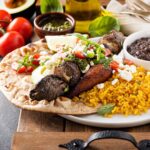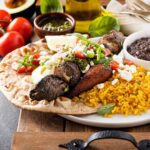Food is an essential element in people’s lives, but in Latin American cultures, its importance is magnified, especially during celebrations and festivities. At “Azucar Restaurant,” we understand that each dish is not only a combination of flavors, but also a vehicle for tradition, history, and community connection. In this article, we will explore the role of food as central in the celebrations of different Latin American cultures, and how these moments are an opportunity to honor our roots and share experiences.
Food as a Cultural Connector
In Latin America, every holiday is a celebration of identity, and food acts as a thread that unites communities. From the Day of the Dead in Mexico, where offerings are prepared with dishes such as pan de muerto and sugar skulls, to the celebration of Christmas in countries such as Peru, where turkey and panettone are protagonists on the family table, gastronomy is a reflection of the customs and values of each culture.
Typical dishes are not just consumed; they are prepared and shared as a family, strengthening ties between generations. This ritual around food allows traditions to be passed down from parents to children, keeping cultural heritage alive.
Festivities and Their Emblematic Dishes
Each celebration has its own emblematic dishes that make it unique. In Colombia, the Flower Fair is accompanied by a tray paisa, a hearty dish that brings together the flavors of the region. In Argentina, the barbecue is king of the grill, becoming a symbol of family reunion during Independence Day.
In the Brazilian Carnival, spicy and tropical flavors are evident in dishes such as feijoada, a black bean stew that is shared at large gatherings. These meals not only satisfy the palate, but also evoke memories and celebrate the diversity of Latin American culture.
Spirituality and Food
For many communities, food during festivities also has a spiritual component. On the Day of the Dead, for example, families prepare the favorite foods of their deceased loved ones, creating a link between the earthly and the spiritual. The dishes become offerings that honor memory and celebrate life.
Likewise, during Holy Week, traditional food such as cod in some countries is prepared with great respect, as part of a ritual that deepens the spirituality of the celebration. The preparation and consumption of these dishes are acts that transcend the physical and delve into the emotional and spiritual.
Food as an Act of Inclusion
Holidays are also opportunities to include everyone in the celebration, and food plays a fundamental role in this. At “Azucar Restaurant,” we believe that each dish is an invitation to share and enjoy together. Holiday meals are often a reflection of the diversity of the community, where different culinary influences intertwine to create a feast that celebrates unity in diversity.
Food at Latin American celebrations is much more than just sustenance; it is a symbol of identity, history and community. At Azucar Restaurant, we honor this rich tradition by offering a menu that celebrates the diversity and authenticity of Latin American cuisine. Each dish we serve is a tribute to the festivities that unite us and the cultures that enrich us. We invite you to experience this culinary magic and be part of our gastronomic journey. Come celebrate with us at Azucar Restaurant!












